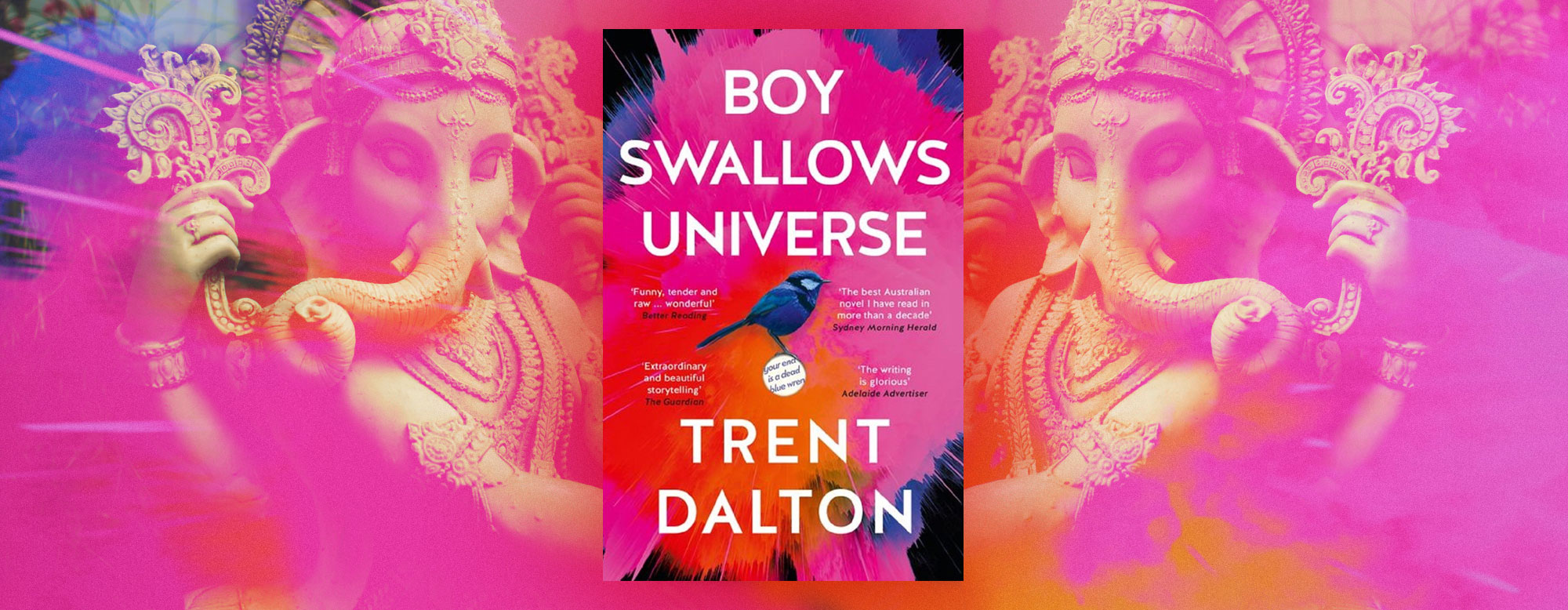I’ve been trying to put my finger on the reason why Trent Dalton’s book Boy Swallows Universe (HarperCollins, 2018) is so popular. For the first time in the history of the Australian Book Industry of the Year (ABIA), Dalton’s work won all four major categories: Book of the Year, Literary Book of the Year, the Matt Richell Award for New Writer and Audio Book of the Year. It also won the 2019 NSW Premier’s Award as well as the 2019 MUD Literary Prize.
What’s more, it’s currently being turned into an international TV series which will surely only add to its popularity. Some in American have likened it to a “foul-mouthed Tom Sawyer”. But the better analogy is that it’s an Aussie version of the classic film, The Shawshank Redemption. (Which, by the way, was originally one of four novellas written by Stephen King called, “Rita Hayworth and the Shawshank Redemption”). Dalton’s book has become so popular that even Akos Balogh wrote in his review for The Gospel Coalition:
I had to tell my daughter to hide this book from me, so I’d actually get some sleep.
Whenever I picked it up, I found it hard to put down. Boy Swallows Universe by Australian Journalist Trent Dalton is a book that grabs you by the collar and doesn’t let you go.
As such, Dalton’s work is being lauded by everyone from Geoffrey Robertson, Richard Glover, Nikki Gemmell, Caroline Overington, David Wenham and Annabel Crabb. The Australian described it as “the best literary debut in a month of Sunday’s”. Benjamin Law went even further and proclaimed, “Call it a hunch, but I think he might’ve just written an Australian classic.” Clearly, Dalton is a gifted communicator. (He is also currently a staff writer for The Weekend Australian Magazine, former assistant editor of The Courier Mail, and a two-time winner of a Walkley Award for Excellence in Journalism.) But what is it that has made his debut novel so compelling?
At almost 500 pages it is not a short read. And while it could have done with a good edit at points, it’s a novel that is reflective of the zeitgeist of our age. The central plot—based largely upon the real events in Dalton’s life—revolves around family breakdown, drug abuse, and domestic violence. In this sense, it’s like surveying the scene of a car crash in that it’s both deeply sickening but also strangely compelling, which makes it difficult to look away.
The fact that it’s also set in 1980’s Australia, the glory days for many in the ‘boomer’ generation, means that it’s permeated with pop-culture references relating to soft-drink, lollies, cricket celebrities, movie stars, video games, TV shows, a growing multiculturalism and most of all music. This was a time when the mighty Parramatta Eels were a rugby league force to be feared, and the names of Price, Kenny and Cronin were household names. As such, this is like a nostalgic trip down memory lane, which also explains the novel’s broad appeal to tradies as well as academics.
What’s more, Dalton’s writing style is manic. It’s like he has literary ADHD. What one reviewer from The New York Times described as “hyperactive journalese”. This might sound exhausting, but in this age of social media created digital distraction, Dalton’s writing is compelling and reflective of the wider social discourse. It’s also saturated with swearing, and laced with quintessential black humour, unique to the Aussie culture. What’s more, his attention to detail really draws the reader into the world he grew up in. Dalton says 60% of the book is autobiographical and the other 40% fiction.
In one of the book’s later scenes, the main character (Eli Bell) attempts to get a cadetship at The Courier Mail. He waits outside all day for an interview with the gruff and angry editor, Brian Robertson. When they finally meet in the car park after 9 o’clock at night, Robertson challenges Eli to sum up his story in three words. In a classic illustration of art imitating life, Dalton titles every one of the twenty-three chapters with a three-word summary, the significance of which I will explain more shortly.
Without giving too much away, the story revolves around two brothers, Eli (12) and his older brother August (14). Due to a traumatic event in their young lives, August has stopped talking. And the way he has chosen to communicate is by writing with his finger in the sky. But through an even more dramatic set of circumstances, Eli and his brother go from living with their mother and her boyfriend—who deal drugs—to living with their alcoholic father. The only stable influence in their life is a man named Slim Halliday, based on the real-life character of the same name, who is a convicted murderer.
Throughout this completely chaotic and dysfunctional situation, August and Eli believe that they have the esoteric ability to see into the future through a “moon pool” that August creates sometimes at night. But in one of the key scenes, the title of the book is made plain. Both boys are lying in bed at night and relay a story that Slim has told them that he had read while in jail. As Eli says:
a story about some god, or some special guy from a religion different from the wooden cross one we knew, not one where Jesus was the hero, but one that was spoken of in the kinds of places Slim said Indiana Jones liked to visit.
The story is of Young Krishna and the Universe in His Mouth. If, like me, you weren’t familiar with it then here is a quick summary and explanation:
A young child (the Hindu god Krishna) is playing with some children who exclude him from their games. They all climb a tree but he is not allowed too but instead starts to eat all the fruit that they pick and discard. The child becomes so ravenous, though, that he starts to eat dirt as well as fruit. And so, the other children call out to his mother to get him to stop. But after the child says that he hasn’t any dirt in his mouth she looks into his mouth and to her shock and amazement sees the entire universe.
This story becomes the central paradigm for the book. And yet, strangely, in all of the reviews I have read, not a single person picks up on this. For the point is that young Eli is discarded by the world and has to eat the scraps—literally and metaphorically—that no one else wants. But in his hunger for love and acceptance, he not only eats ‘food’ but also ‘dirt’. However, because he is ‘special’ (another major sub-plot of the book) he is able to transform everything into his own universe, or maybe that should be ‘multiverse’? That’s why so many of the chapters have titles alluding to actions that only a god-like figure could achieve; e.g. drowning the sea, conquering the moon, stealing the ocean, mastering time…and in the penultimate chapter, swallowing the universe!
As can be seen on every front cover, central to the book’s plot development is a cryptic phrase, “Your end is a dead blue wren”. This is a prophecy that Eli’s brother August utters at the beginning of the book in one of his esoteric dream states. But there are other key times in the book where Eli or August receive a message from the universe as to what they should do or whom they should connect with. This proves that they are not only “special”, but in keeping with the Hindu myth, also in a divine, spiritual sense of the term.
This is first confirmed early in the book through a friend of their drug-addicted mother, a Moroccan woman named Astrid. Dalton describes her as “…beautiful and permanently young and always so bejewelled and mystical…” She pronounces over August that he has is “special” and integral to her path to spiritual enlightenment. The reason she knows this is because an angelic guide tells her. But for anyone familiar with the Bible, what Dalton describes is more in keeping with a demon than anything else:
Spirit, we would later discover, was an all-encompassing term for the creator of all living things who visited Astrid on occasion in three manifestations: a mystical white-robed goddess spirit, Sharna; an Egyptian Pharaoh named Om Ra; and Errol, a farting, foul-mouthed representations of all the universe’s ills, who spoke like a small drunken Irishman.
The point that Eli and August are spiritually special is again reinforced when they first meet the villain in the book, a drug dealer king pin named Tytus Broz who runs a local amputee factory. The following setting and dialogue is probably best quoted verbatim:
“There was a pottery figurine of an ageing man in chains on his desk. The ageing man was wearing an Ancient Greek man dress, and had oil paint blood streaks across his exposed back. He was mid-stride, favouring a led that was missing a foot and bandaged roughly.
‘What’s that/” I asked.
Tytus turned to the figurine.
‘That’s Hegesistratus,’ he said. ‘One of history’s great amputees. He was an Ancient Greek diviner capable of profound and dangerous things.’
‘What’s a diviner?’ I asked.
‘A diviner is many things,’ he said. ‘In Ancient Greece the diviners were more like seers. They could see things others could not see by interpreting signs from the gods. They could see things coming, a valuable skill in war.’
I turned to Lyle, ‘That’s like Gus,’ I said.
While August receives messages from the gods through his ‘moon pool’, Eli (as well as his enemy Tytus Broz) receives them through a secret red telephone. It sounds cliché, but it symbolises their very own hotline to the gods. However, being a truly post-modern book, the reader is ultimately not quite sure if this is another manifestation of psychological trauma dating back to the boy’s childhood and something which Eli at least, will grow out of once he connects with the girl of his dreams.
But it’s this serious integration of mysticism which really gives the book it’s cutting edge and ultimately ‘hope’. For without being able to in any way ‘divine’ the future, Eli and August would simply be victims of their own horrible upbringing. In fact, like their friend Slim did when he was confined in solitary confinement, it is also the mechanism in which they seek to escape their own ongoing psychological suffering. By escaping into another universe.
A key example as to how Eli transforms all of the “dirt” of life into a universe through his mouth is by his meteoric career rise as a journalist at The Courier Mail. Without any formal training—or even having successfully graduated High School it seems—Eli is able to produce not one, but two, front-page articles.
Another important sub-theme that runs through the book is—especially regarding the men around him—is any of them truly “good”? And yet, in a world of drug dealers, alcoholics and murderers none of them seems to be prepared to recognise their own depravity. But then it struck me. This is precisely why the book is so popular. Because it is a story of salvation by works.
In this post-Christian age, Australia is not only become more secular, but increasingly more pagan. The spiritual void that should be reserved for Christ is instead being filled with Eastern mysticism. And sadly, no one is stopping to discern whether or not it’s all true. But the reality is, is that this religious myth is the oldest lie of them all. It is the original temptation of Satan back in the Garden of Eden, for Adam and Eve to become like God (see Genesis 3:5). And rather than come to Christ for forgiveness, the message of the book is about saving oneself.
For Dalton, though, redemption ultimately comes through a highly unlikely romantic relationship with an older woman. This is what saves Eli and brings him back to ‘reality’ and out of his imaginary universe. A world which we’re never quite sure now truly exists. Although it somehow or other must since the death of the blue wren was a mystical sign giving his life guidance and meaning. Thus, in true postmodern fashion, everything is incoherently thrown together. Which is Hinduism, pure and simple.
So, why is Boy Swallows Universe so popular? There is obviously a lot to like about the book: love, brotherhood and unlikely friendships. There is also a rich sub-plot to be explored regarding the role of fathers, and the devastating impact upon us as individuals and society as a whole when they are missing. For, somewhat simplistically, nearly every adult male character in the book is negative, whereas every female character is positive.
But there is one aspect in particular that everyone seems to be missing. And that is, that of religion. For at the heart of Dalton’s bestselling novel is the spiritual worldview of Hinduism. That each person is ‘special’ in that we ourselves are God.
But the reality is, we are not divine. The universe is not in our mouths. However, the Bible tells us that the One who made the heavens and earth has died in our place so that we might be healed. God has done for us what we could never do for ourselves. Jesus has taken the punishment for sin which we deserved. For in three words, the reality is not, “Man Becomes God” but “All Have Sinned”. All of which means the greatest news of all is that anyone can be forgiven, as soon as they confess that, “Jesus is Lord!”





















